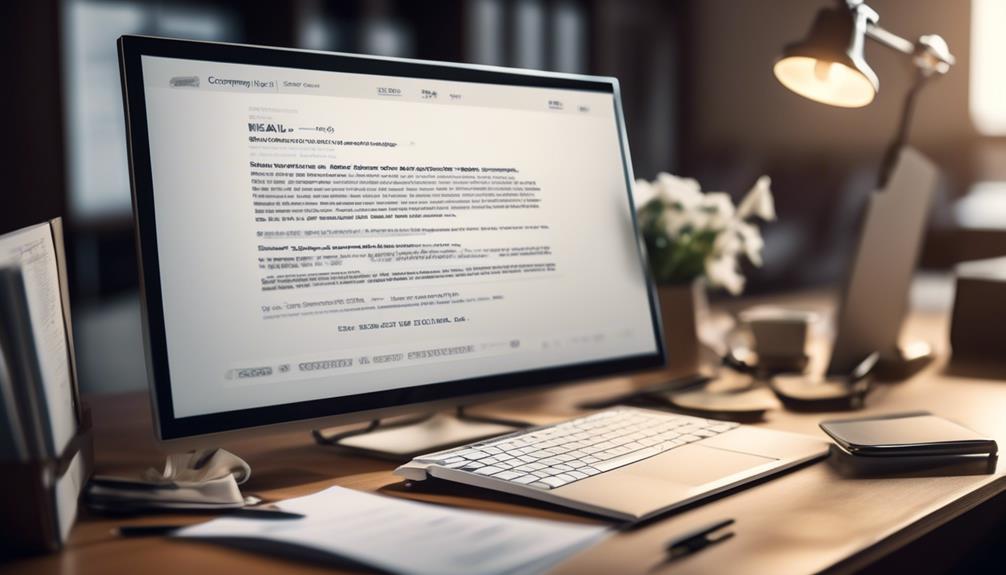It’s widely understood that a significant 86% of professionals opt for email as their chosen mode of communication for business activities, underscoring the importance of becoming proficient in this area.
But have you ever found yourself staring at a blank screen, unsure of how to craft a compelling inquiry email that will get you the information you need?
With a few simple guidelines and best practices, we can ensure that your emails make a professional impression and yield the results you’re looking for.
So, how can we effectively engage recipients and convey our message with clarity and professionalism?
Keep reading to discover the key elements for success in crafting impactful inquiry emails.
Key Takeaways
- Email communication is preferred for business purposes, making business inquiry emails important for gathering information and establishing connections.
- Crafting a compelling message involves capturing the recipient’s attention, using clear and polite language, and providing specific examples or details related to the inquiry.
- Best practices for writing a business inquiry email include using a professional format, keeping the email clear and concise, including contact details, asking specific questions, and being as specific as possible.
- Key elements for success in a business inquiry email include starting with a warm and direct opening, using polite and professional language, clearly stating the reason for reaching out, including clear information or questions, indicating desired next steps, and ending with a professional closing expressing gratitude and providing contact details.
Understanding Business Inquiry Emails
Understanding Business Inquiry Emails plays a crucial role in professional communication, as it allows individuals to gather necessary information and establish connections with potential business partners. When crafting a professional business inquiry, it’s essential to clearly articulate the purpose of the email.
Whether seeking information about a specific product or expressing interest in a potential business collaboration, the business inquiry email sets the tone for future interactions. A well-written business inquiry email should convey professionalism, clarity, and a genuine interest in the recipient’s expertise or offerings.
In our experience, a successful business inquiry email sample often includes a concise yet comprehensive request for information, demonstrating a clear understanding of the recipient’s time and priorities. Crafting a job inquiry email also follows a similar approach, emphasizing the value and skills one brings to the potential employer.
Crafting a Compelling Message

Crafting a compelling message is essential for effectively conveying the purpose and intent of a business inquiry email. When writing a business inquiry email, it’s crucial to craft a message that’s both professional and engaging. A compelling message captures the recipient’s attention and clearly articulates the reason for the inquiry.
To achieve this, it’s important to use language that’s clear, concise, and polite. Crafting a compelling message involves structuring the email in a way that’s easy to follow and understand. Providing specific examples or details related to the inquiry can help to make the message more compelling. Additionally, using a professional tone and adhering to proper email etiquette enhances the overall quality of the message.
Best Practices for Writing
When reaching out through a business inquiry email, ensuring a clear and concise format sets the stage for effective communication, and understanding the best practices for writing can significantly enhance the impact of the message. To write a professional email, it’s essential to be as specific as possible.
The following best practices for writing a business inquiry email can greatly improve the chances of a potential collaboration:
- Email Format
- Use a professional email format with a clear subject line and a formal greeting to set the right tone for the communication.
- Keep the body of the email clear and concise, providing all necessary details without overwhelming the recipient.
- Content
- Include contact details in the email signature to make it easy for the recipient to reach out if interested.
- Ask specific questions to demonstrate a genuine interest in the potential collaboration and to encourage a response.
Examples of Business Inquiry Emails

Exploring various sample business inquiry emails can provide valuable insight into effective communication strategies and help illustrate the application of best practices in real-world scenarios.
When writing an inquiry email, it’s crucial to convey professionalism and clarity. For instance, a product inquiry email should be structured in a way that clearly articulates the specific details being requested.
An effective email for business inquiries should include a concise subject line, a polite salutation, a brief introduction of the sender, a clear statement of the inquiry, and a professional closing. Request emails should always maintain a respectful tone and be devoid of any ambiguities.
It’s also essential to send an inquiry email to the appropriate recipient. Examples of business inquiry emails can serve as a guide for crafting one’s own correspondence and can offer valuable insights into the most effective ways to seek information regarding products, services, or other business-related matters.
Key Elements for Success
Studying examples of business inquiry emails not only offers valuable insights but also lays the foundation for understanding the key elements for success in crafting effective and professional communication.
When writing an inquiry email, it’s crucial to incorporate specific elements that enhance professionalism and clarity. Here are the key elements for success:
Introduction:
- Start with a warm and direct opening line that captures attention.
- Use language that’s polite and professional to create a positive first impression.
Clear Purpose:
- Clearly state the reason for reaching out in the email.
- Provide a brief and concise explanation of the purpose of the email, such as expressing interest in a potential job opportunity or requesting specific information.
Specific Details:
- Provide clear and precise information or questions in the email body.
- Include relevant details such as the desired job title, Company Name, and any additional information needed to convey the message effectively.
Call to Action (CTA):
- Indicate the desired next steps in the conversation.
- Clearly express what you hope to achieve and prompt a response or specific action from the recipient.
Professional Closing:
- End with a professional closing expressing gratitude and providing contact details.
- Include a well-crafted email signature to leave a lasting and professional impression.
Incorporating these elements into your business inquiries will help ensure that your emails are effective, professional, and impactful.
Frequently Asked Questions
How Do You Write an Email Inquiry Example?
We write an email inquiry example by clearly stating our purpose, providing relevant details, and using a professional tone.
It’s important to be concise and direct while also being polite and respectful.
Including specific questions and a clear call to action can help ensure a prompt and helpful response.
Our example should demonstrate our professionalism and attention to detail, making it easy for the recipient to understand and respond to our inquiry.
How Do You Politely Inquire in an Email?
We politely inquire in an email by expressing appreciation for the recipient’s time and expertise.
We start with a courteous greeting and clearly state our interest.
For example, if we are inquiring about potential collaboration, we would express our interest in working together and outline any specific ideas or goals we have.
We then express gratitude for their consideration and the time they take to review our request.
This approach ensures a respectful and effective communication.
How Do You Email Inquiries?
We email inquiries by crafting a clear and concise message that includes all necessary details.
It’s important to maintain a professional tone and ensure that the email is personalized to the recipient.
Researching the recipient and their business beforehand can greatly enhance the effectiveness of the inquiry email.
We also need to consider the purpose of the inquiry and tailor our approach accordingly, whether it’s about a product, price, job, or any other matter.
How Do You Write an Official Inquiry?
When writing an official inquiry, we start by clearly stating our purpose and providing relevant details.
We use a professional tone and structure our email with a clear subject line and concise paragraphs.
It’s important to be polite and respectful in our language, and to proofread for any errors before sending.
This ensures that our inquiry is effective and leaves a positive impression on the recipient.
Conclusion
In conclusion, crafting a well-written inquiry email is crucial for effective communication in a professional setting. By following the basic format and best practices, we can ensure that our message is clear and compelling.
Remember, a well-crafted inquiry email is like a key that unlocks the door to valuable information, so take the time to make it polished and professional.









